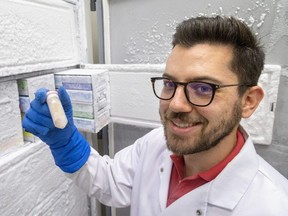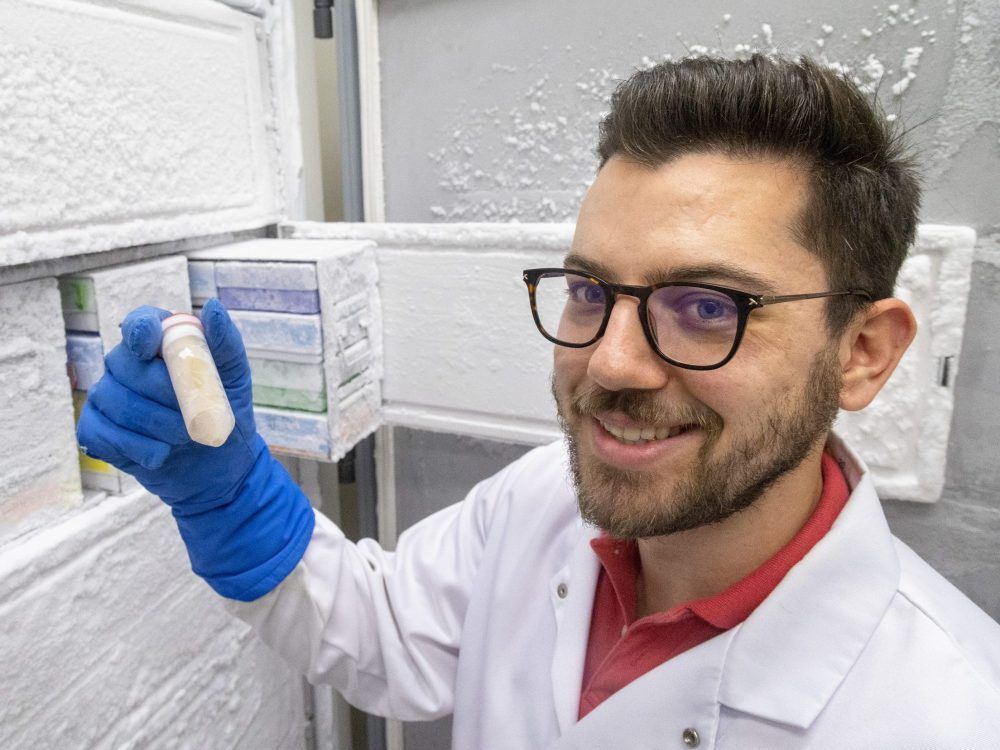A London hospital is looking for a special kind of donor – one who doesn’t give a shit.

content of the article
A London hospital is looking for a special kind of donor – one who doesn’t give a shit.
advertising 2
content of the article
St Joseph’s Health Care London is on the lookout for healthy adults willing to ditch their pants to save a life by using beneficial gut microbes from donor feces to treat a stubborn and potentially deadly gut infection.
“We used to think of the bacteria in the gut as irrelevant waste,” said Michael Silverman, medical director of the St. Joseph Infectious Disease Treatment Program.
“But we now realize that they are very metabolically active and very involved in many processes of health and disease.”
The human gut houses a
symphony
of microbes that play an important role in people’s overall health. Stool transplants from healthy donors can help restore order in the recipient’s gut, Silverman said, particularly in patients with Clostridioides difficile (C. diff), a hospital-acquired bacterial infection of the lower gut.
advertising 3
content of the article
As the name suggests, C. difficile can be a difficult disease to treat. In the mildest cases, the bacteria can cause severe diarrhea. At worst, it can permanently damage the colon, require surgery to remove affected parts, and threaten patients’ lives.
There are effective antibiotics for C. difficile, and in about 80 percent of cases, a round of the drug knocks out the infection for good, Silverman said. The problem is that the antibiotics also damage the good bacteria in the gut.
“The normal bacteria in your colon are like cats roaming around, and C. difficile are the mice. The problem is that every time we treat C. difficile with antibiotics, we not only kill the mice but also the cats,” he said.
“All you need is one pregnant mouse left over and you’ll be overrun by rodents again.”
advertising 4
content of the article
The stool transplants are especially helpful for people in the remaining 20 percent who have recurrent C. difficile infections, Silverman said.
To date, about 80 C. difficile patients have received stool transplants — administered through oral capsules — as part of the St. Joseph’s program, Silverman said. The cure rate after treatment is about 97 percent, he said.
You don’t need a superhuman stomach to take the capsules, Silverman said. Donor poop is processed in a lab, leaving only the beneficial gut bacteria with no poop taste or smell. The microbes are then placed in the caplets and frozen.
The capsules are useful because they disperse the beneficial microbes throughout the gut as they pass. Silverman, who started doing stool transplants here in 2003, said enemas only reached the lower part of the intestine.
advertising 5
content of the article
The St. Joseph’s program has about five chair donors but could use at least five more, Silverman said. The fecal donor selection process involves rigorous screening, including blood tests, urine samples, fecal samples, nasal swabs, and a medical history to ensure individuals are perfectly healthy.
Of 43 people screened for a recent study, only five were accepted.
“We’re looking for healthy, young people who aren’t on medication, young adults between the ages of 18 and 50 who don’t have underlying medical conditions,” he said, adding that some people have pathogens that aren’t a problem for them. but could be a problem if transplanted into someone else.
“A lot of people come forward and the joke is that it’s easier to get into Harvard than to become a stool transplant donor because the acceptance rate is higher there.”
advertising 6
content of the article
The pandemic has made it difficult to recruit and retain donors, he said. In addition, donors cannot always attend due to COVID-19 infection or other illnesses.
Chair donor John Chmiel began the St. Joseph’s program in 2018. The 26-year-old, also a graduate student in microbiology at Lawson Health Research Institute’s Canadian Center for Human Microbiome and Probiotics in St. Joe’s, brings samples to the hospital lab several times a day from month to month.
He learned about the program from a fellow graduate student and jumped at the unusual opportunity.
“This is such a cool field of research. The fact that we can basically heal each other by sharing each other’s microbes is sweet,” he said Wednesday.
“I often use it as a conversation starter when meeting new people. It’s kind of a fun way to break the ice. People think at first that they misunderstood you. But I tell them it’s legit and about the process and they’re always very interested and intrigued. Nobody I met was put off by that.”
advertising 7
content of the article
The donor process is quick and straightforward, Chmiel said. He uses a kit to collect the stool sample and delivers it to the hospital lab for processing.
There are many other uses for stool transplants, Silverman said. London researchers launched a study in 2019 to see if the beneficial poop microbes could improve the effectiveness of immunotherapeutics, drugs that stimulate the body’s immune system to attack and kill cancer cells, in melanoma patients.
A study into whether stool transplants can improve immunotherapy for kidney cancer is underway, and London researchers are awaiting approval to start a similar study in patients with pancreatic cancer, Silverman said.
“Cancer may seem like a far cry from feces, but the bacteria in your gut are really important in fine-tuning your immune system,” he said. “We have also looked at this in atherosclerosis, hardening of the arteries and certain autoimmune diseases such as arthritis. . . . There is a lot of potential.”
To apply to be a chair donor, call 519-646-6100, ext. 61726, or email research coordinator Seema Nair Parvathy at
.
#scoop #poop #London #hospital #donors


Leave a Comment